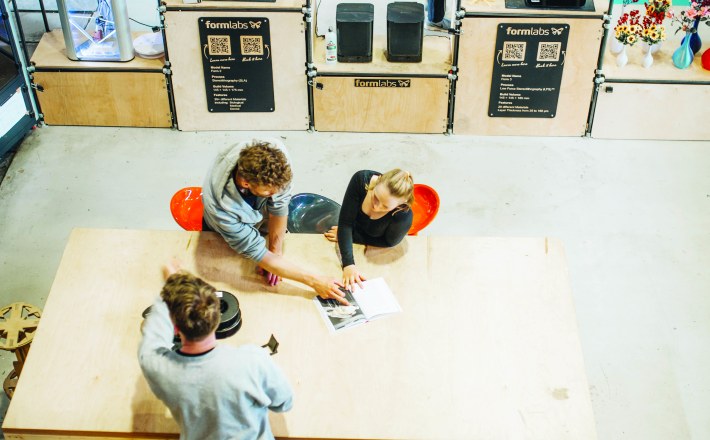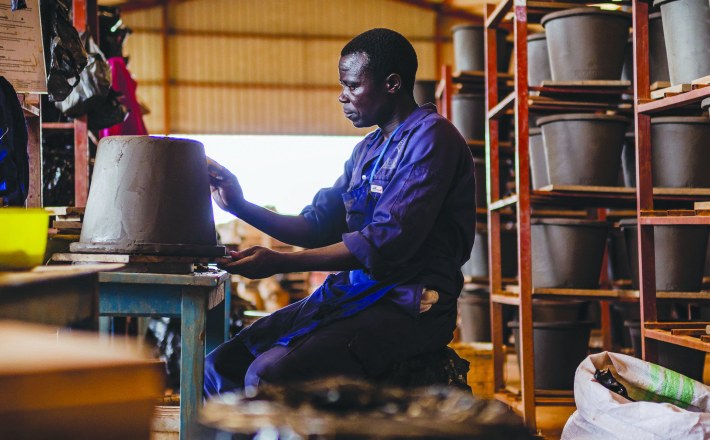Good Night
The nocturnal hours have become something of a status symbol: endless brands and technologies now focus on deep sleep, which reputedly makes us energised, healthy, and beautiful. But what happens if that gradual slide into the world of dreams remains inexplicably elusive? Jessica Hoyer from Hamburg founded the ByNacht brand to help people fall asleep. And to look better when they awake.
‘Maybe the night was a little bit short, but I did sleep like a baby,’ says Jessica Hoyer — her chirpy voice leaves you in no doubt. ‘Actually, I never go to bed without having applied a combination of my products.’ The products she’s talking about are balms and serums, creams and oils — 13 different types in dark crucibles and bottles, for both men and women. ByNacht is the name they bear, referring to the label that the Hamburg-based entrepreneur founded roughlya year ago. ‘I ran my own advertising agency for many years, managed VIPs, and generally worked way too hard,’ she says. ‘I was travelling all over the place, maybe 190 days per year. Every second day I was catching a plane or a train.’ Jet lag on heavy rotation. Sometimes she woke up in the morning unsure of which hotel or even which country she was in. ‘The fatigue was permanent, and I looked the way I felt,’ says Jessica. ‘Like a real time-zone zombie.’ Despite all the success she achieved as a businesswoman in the advertising industry, her schedule pushed her to the brink of a burnout.The nights became shorter, the anxious glances at the alarm clock more frequent. Just six hours sleep, then five, eventually four. ‘That has no future, of course. You end up going bonkers,’ says Jessica. ‘I lost the ability to unwind. I was so tired and fatigued that I couldn’t sleep.’ She tried all kinds of remedies in the United States, to which she travelled several times each year on business. Among them were prescription drugs with melatonin that are not even approved in her native Germany. ‘They help you get to sleep, but during the day you feel like you are living in a balloon, far too relaxed, completely zoned out,’ says Jessica. So she went back to attending the next business lunch feeling jaded, and could barely stay awake for the meeting that followed. It was fairly probable that the folks on the other side of the table were equally zonked.

After all, a 2014 study by the Gottlieb Duttweiler Institute in Switzerland entitled ‘The Future of Sleep’ delved into what was happening in the beds of busy urban nomads: the study determined that, on average, people in Western industrialised nations are sleeping one hour less compared to 20 years ago. Moreover, 35 percent of the respondents stated that their sleep quality had deteriorated sharply — which can lead to cardiovascular problems, stomach complaints, depression, and obesity. The chief executive, the manager, the doctor working shifts, the young mother — all of them need and want to sleep better but often find themselves unable to do so.Jessica got fed up in the end — just like her mother. ‘She is an aromatherapist, so she mixed a concoction for me.’ Aromas? Bergamot and ylang-ylang? But isn’t that just hocus-pocus, more for the esoterically inclined? Jessica certainly used to think so. But: ‘The aroma balm helped me sleep like a log,’ she says. From that moment, the entrepreneur was a true believer. She wanted to know and read everything about aromatherapy and how it can help people to sleep. She explored combinations, experimented, and consulted chemists and sleep researchers.Her scepticism gradually gave way to curiosity, then interest, and finally to an almost diehard fascination. Then came the business idea: ‘I spent seven years immersing myself in the topic, finding out what works, what doesn’t, and what is essentially just quackery,’ says Jessica. ‘Eventually I wanted to see my ideas come to fruition.’With ByNacht, Jessica has taken a holistic approach that consists of two phases: first, there are the balms and oils that not only help people to get to sleep but also to extend and intensify their deep-sleep phase. That’s the period in which the body is, in a way, particularly productive. ‘Collagen production and moisture retention only pick up during the phase of deep sleep. Lots of growth hormones are secreted as well,’ explains Jessica. These are the hours in which the body regenerates and the skin becomes particularly receptive. So Jessica responded by adding nourishing creams and serums to her portfolio.

‘You will only look good if you sleep well — that’s still a key to success,’ she says. ‘Maybe without it you can get pumped and feel energised, then use makeup to hide the shadows under your eyes — but your skin will only benefit if you get good deep sleep.’ Jessica developed the two-phase concept together with German cosmetics laboratories and the renowned sleep expert Rebecca Robbins from New York University. During this time she lived in fear that another company would sneak in ahead and launch a similar product on the market. Her concerns were not unfounded, as sleep has become a real hot topic. Startups with fine-sounding names like Casper or Simba have launched mattresses that they claim are the perfect marriage between premium design and outstanding comfort. People are spending just as much time on the layout of their bedrooms as they are on the more public areas of their homes. Design journals like Architectural Digest print page after page with gushing reports on the master bedroom.Fashion is catching up as well. Pyjamas and negligees that look as good in the pub as they do in bed have conquered the runway shows of luxury brands and feature heavily in the portfolios of high street labels. Digitisation is infiltrating our nocturnal hours as well. Apps and wearables, such as bracelets or rings that analyse our sleep, are taking the trend to extreme levels. All of a sudden, sleep is no longer a time-consuming, slightly bothersome necessity. It has become a status symbol that needs to be nurtured and fed. But no one seems all that bothered about the skin, the largest human organ.‘Your body will tend to sideline your skin as an unnecessary frill if you don’t sleep enough,’ says Jessica. ‘It will first focus on regenerating everything else, so your liver and kidneys. Then it will detoxify your body and bring structure to your memories.’ All of these things will be done before the body takes time to look after the skin. So it’s not ideal if a short night between tousled bed linen simply doesn’t provide the required time. ‘In the lab, you can look at a cell and see whether the person had a rough night,’ says Jessica, referring to ByNacht’s test phase. ‘It’s like smoking. For ages people thought that even one cigarette wasn’t all that bad either.’ Jessica does not have a single secret weapon ingredient that she includes in the entire product portfolio. She is rather more concerned with creating a complex but sensible combination — even if doing so makes communicating the brand’s message more difficult at times. ‘Our label still needs to work hard to get the message across,’ she says. ‘And of course, I never get tired of explaining our concept.’ For Jessica, that concept consists of more than an optical effect. The key element, according to the young mother, is the ritual of looking after yourself for the half hour before you go to bed. ‘That’s ‘metime’, the moments I consciously take for myself. It’s a good chance to reflect on the day.’ Scientists share this view — namely, that regularity at the end of the day can improve the quality of sleep. Our bodies and spirits find it easier to unwind if we follow a particular rhythm. But what happens if we still can’t get to sleep? ‘Get up,’ Jessica says dryly. ‘Sometimes I open a window and let the fresh air in, dim the lights, and drink a mug of lavender tea. Then I just wait until tiredness comes, all by itself.’




